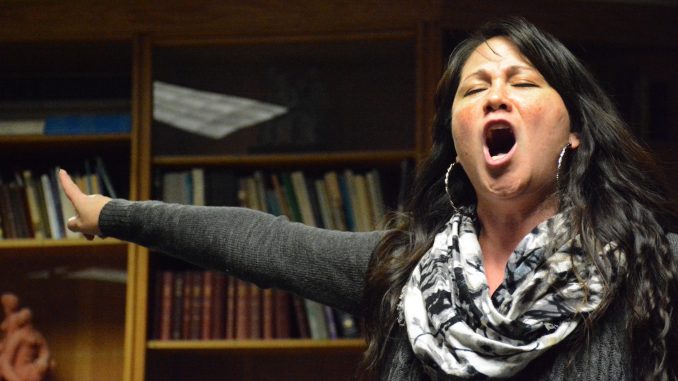
During her 15 years of teaching, Dr. Donna Marie Peters, a professor in the sociology department, noticed many of the Muslim women in her classes were not speaking up.
She wanted to find a way to encourage them to share their voices.
“I realized that they come from gender segregated environments,” Peters said. “So I thought, ‘Well why don’t I try to make it a space only for women, because they’re comfortable with that?’”
Peters created the Global Women’s Dialogue in 2013 aimed specifically at helping women in her classes and on Main Campus find their voices. She has held this event every semester since then, focusing the dialogues on topics like “Microaggressions” and “Women and Activism.”
The most recent Global Women’s Dialogue was held Nov. 13 in the Women’s Studies Lounge of Anderson Hall, where about 50 people gathered to discuss this year’s theme of the ways women are portrayed in pop culture.
“If [the dialogue] got them thinking about the influence of popular culture in their lives, they have more control over their lives and the images that they buy into,” Peters said. “They have power over what influences them.”
The dialogue began with spoken word performances by the poetry duo Yellow Rage, composed of Catzie Vilayphonh and Michelle Myers, an adjunct assistant professor in the Asian studies department.
The two performed poems like “I’m a Woman, Not a Flava” and “Listen A——” which addressed stereotypes about Asian Americans, specifically Asian women.
Myers told the crowd the duo confronts stereotypes about the passivity of Asian women by using profanity in their poems, which she said often bothers some audience members.
“People just don’t seem to get it,” Myers said. “If you make me that angry, that’s how I’m going to sound.”
Following these performances, representatives from the seven student organizations and sororities that helped Peters organize the event gave presentations related to women in pop culture.
Robyn Moore, a senior sociology major from the Sociology Undergraduate Majors and Minors Association, helped lead a presentation about the sociological theory behind popular culture.
Moore and her presentation partner used statistics to explain “how the population of the U.S. isn’t really represented in pop culture.”
Women are more likely to be portrayed sexually or submissively in pop culture, Moore said. African American women are often not portrayed at all, she added, and when they are, it’s usually in stereotypical roles.
“Our main point was to talk about, like ‘Why are things this way?’ and like, ‘Who’s creating pop culture?’” Moore said. “The majority of pop culture is created by white men and … that’s why white men are overrepresented.”
Saovleak Khim, a freshman neuroscience major, said her group discussed whether or not rapper Nikki Minaj is a good role model for women.
“She shows more nakedness on stage and in her music videos, and some people thought it was inappropriate for her to be like that,” Khim said. “In my perspective, I believe in choice.”
Jeremy Taitano, a senior political science major, said his group discussed how pop culture also affects men.
“I think probably the most important thing said was that male masculinity has become very fragile,” Taitano said. “Men have become kind of afraid of feeling anything.”
This was the first year in which the men who came to the event did not form all-male discussion groups, Peters said. It was also important that the women still had the opportunity to join all-female discussion groups if they wanted to do so.
Peters said she hopes all the students who attended the dialogue came away from the event with new friendships and a better understanding of the images constantly presented to them in popular culture.
“Popular culture has a major influence on our lives,” Peters said. “And I think we were able to convince them that it does.”
Jennifer Roberts can be reached at jennifer.roberts@temple.edu or on Twitter @jennyroberts511.


Be the first to comment